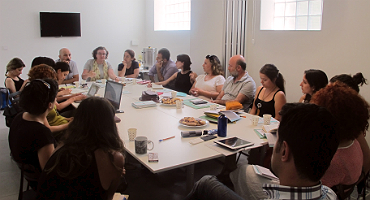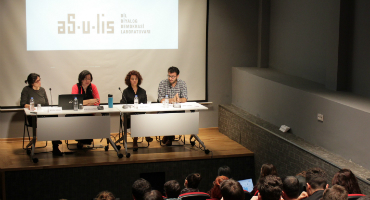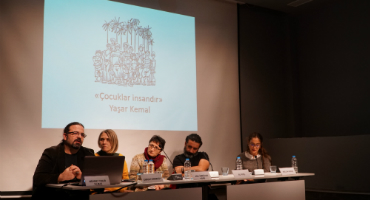On November 3, 2016, in the second Asulis Educational Research Meeting held in Hrant Dink Foundation, “needs”, “problems” and “suggestions” in education were discussed with participants consisting of various institutions and independent researchers. In this second research meeting, participants’ expectations from Asulis Laboratory, how Asulis as a platform can contribute to the studies concerning discrimination in education, the ways for using new and alternative methods by benefiting from various disciplines and possible obstacles were discussed.
Batuhan Aydagül (Education Reform Initiative), Aysel Madra (Education Reform Initiative), Nesrin Uçarlar (Diyarbakir Institute for Political and Social Research), Elmas Arus (Zero Discrimination Association), Seçin Tuncel (Kaos GL), Melisa Soran (Bilgi University Center for Sociology and Education Studies), Aras Sarıçoban (Private Getronagan Armenian High School) participated in this second workshop aims to gathering ideas together.
The topics of the workshop can be categorized under three main titles and some subtitles are similar in accordance with their content. You can find a list of our discussions below:
1) NEEDS
a) Common Platform
• Need for a common platform that will be maintained, in which people working in the field of education gather together.
b) Methodology
• Designating a method focusing on research and development abiding by the definition of Asulis Laboratory (constituting a space where alternative methods will be developed),
• Developing methods in consideration of the peculiar conditions and needs of the groups subjected to discrimination.
2) SUGGESTIONS
a) Common Platform
• Providing a functional platform that will monitor discrimination in education systematically and extensively (based on concrete statistical data, monitoring secondary sources),
• Bringing the groups working in the field of education together, strengthening the motivation of the institutions working in this field,
• Providing a platform in which people and institutions working on discrimination in education can exchange their experiences and which can be used as a source of reference with different events for such exchanges (an academic panel discussion, exchange of personal experiences, movie screening, experiences of the teachers in field etc.),
• Organizing workshops and making works and experiences put into practice (workshops for children and mixed groups; for instance, “Guide for Rights” by Reform in Education Initiative and putting it into practice through plays),
• Compiling the necessary information for the groups combating discrimination in education, making those groups more visible and bringing them together with other people or institutions working in this field.
b) Methodology and Field of Study
• Alternative models from other countries can be used as examples that would guide practices in the field of education,
• Focusing of extra-curricular methods (moving beyond developing curriculum),
• Making the field of education benefit from other disciplines (for instance, arts and theater are pedagogically significant),
• Following the studies in “Norm Critical Approach” closely, seeking for ways to put a similar method into practice in education,
• Evaluating each group based on the discrimination they are subjected, designating methods in accordance with peculiar needs in order to combat different types of discrimination (for instance, creating different methods for Roma people and LGBTIs),
• With mapping technique, listing the studies on discrimination in education,
• Working with different regions of Turkey in an organized manner.
c) Collaboration with Teachers and Educational Institutions
• Meeting with the student of educational sciences and including them to the platform,
• Meeting with the teachers in “Code Name Teacher” project by Reform in Education Initiative and introducing the Asulis Platform to them,
• Meeting with schools and educators using alternative methods,
• Being in touch with institutions like Eğitim-Sen, Özgür-Sen and Teachers’ Academy Foundation and introducing the platform to the teachers in those institutions (Making a list of NGOs related to teachers and contacting them),
• Reaching to school counselors,
• Including Ministry of Education to process when necessary (since it is the designated authority to apply on the discrimination in educational material).
d) Suggestions to ASULIS
• As ASULIS laboratory, focusing on research and development,
• Contribute to development and keeping up-to-date of the books and similar projects prepared by Reform in Education Initiative and similar groups.
3) PROBLEMS
• Maintaining the common platform
• Gathering the groups experienced discrimination in different ways in the same platform,
• Realizing the variety of needs of the groups subjected to discrimination,
• Avoiding to conduct works that is not compatible with a platform functioning like a laboratory.




